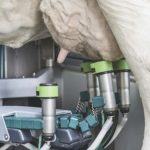Tag Archives Environment

Dairy industry makes strides in sustainability and GHG mitigation
Advances and adoption of new technologies show positive impact, according to new report

Editorial: Sustainability shouldn’t be an optical illusion

Dairy sustainability lead has high hopes for 2050 emission goals
New DFC recruit previously worked with Canadian Cattle Association

U.N.-backed investors set fresh targets in sustainable food shift

Farmers at the forefront of reducing GHG emissions
Sequestering carbon the best way to reduce emissions, according to new report

Editorial: A carrot with a consequence

‘Sticks’ needed to improve soil health, Senate told
Committee begins hearings as it launches first soil study since senator Herb Sparrow released Soil at Risk report in 1984

Opinion: Farmers and the ‘prove it’ generation
Be real about modern agriculture because there’s much to be proud of

Drought, high costs bring U.S. berry giants to Canada
A warming globe is pushing production into new regions as firms hedge their bets

New technology uses radio waves to dry grain
Eliminating heat gets rid of the need for propane or natural gas
